
Water Chemistry
Oxford University Press Inc (Verlag)
978-0-19-760470-0 (ISBN)
Water Chemistry provides students with the tools needed to understand the processes that control the chemical species present in waters of both natural and engineered systems. After providing basic information about water and its chemical composition in environmental systems, the text covers theoretical concepts key to solving water chemistry problems.
Water Chemistry emphasizes that both equilibrium and kinetic processes are important in aquatic systems. The content focuses not only on inorganic constituents but also on natural and anthropogenic organic chemicals in water. This new edition of Water Chemistry also features updated discussions of photochemistry, chlorine and disinfectants, geochemical controls on chemical composition, trace metals, nutrients, and oxygen.
Quantitative equilibrium and kinetic problems related to acid-base chemistry, complexation, solubility, oxidation/reduction reactions, sorption, and the fate and reactions of organic chemicals are solved using mathematical, graphical, and computational tools. Examples show the application of theory and demonstrate how to solve problems using algebraic, graphical, and up-to-date computer-based techniques. Additional web material provides advanced content.
Patrick L. Brezonik is Professor Emeritus in the Department of Civil, Environmental, and Geo- Engineering at the University of Minnesota. His research interests have included various surface water quality issues, nutrient chemistry, natural organic matter, and applications of satellite imagery to analyze large-scale patterns in surface water quality. William A. Arnold is the Distinguished McKnight University and Joseph T. Rose S. Ling Professor in the Department of Civil, Environmental, and Geo- Engineering at the University of Minnesota. His research interests include transformation and remediation of anthropogenic chemicals in the environment, photochemistry, and surface-mediated redox processes.
Preface
Acknowledgments
Symbols and Acronyms
Symbols
Acronyms
Units for physical quantities
Important constants
Conversion Factors
Energy-related quantities
Pressure
Some useful relationships
Part I. Prologue
1 Introductory matters
2 Aqueous geochemistry I: Inorganic chemical composition of natural waters
Part II. Theory, Fundamentals, and Important Tools
3 The thermodynamic basis for equilibrium chemistry
4 Activity-concentration relationships
5 Fundamentals of chemical kinetics
6 Fundamentals of organic chemistry for environmental systems
Part III. Chemical Equilibria and Kinetics
7 Principles of acid-base equilibria
8 Solving acid-base equilibria and the carbonate system
9 Complexation reactions and metal ion speciation
10 Solubility: Reactions of solid phases with water
11 Redox equilibria and kinetics
12 Surface chemistry and sorption
13 Partitioning and chemical transformations of organic contaminants
Part IV. Chemistry of Natural Waters and Engineered Systems
14 Fundamentals of photochemistry and some applications in aquatic systems
15 Chemistry of chlorine and other oxidants/disinfectants
16 Aqueous geochemistry II: Provenance, weathering, and landscape models for natural waters
17 The minor elements: Fe, Mn, Al
18 Dissolved oxygen
19 Nutrient cycles and the chemistry of nitrogen and phosphorus
20 Natural organic matter
Appendix: Free energies and enthalpies of formation of common
chemical species
Index
| Erscheinungsdatum | 09.06.2022 |
|---|---|
| Zusatzinfo | 225 photos and illustrations |
| Verlagsort | New York |
| Sprache | englisch |
| Maße | 156 x 235 mm |
| Gewicht | 1315 g |
| Themenwelt | Naturwissenschaften ► Chemie |
| Naturwissenschaften ► Geowissenschaften ► Geologie | |
| Technik ► Maschinenbau | |
| Technik ► Umwelttechnik / Biotechnologie | |
| ISBN-10 | 0-19-760470-6 / 0197604706 |
| ISBN-13 | 978-0-19-760470-0 / 9780197604700 |
| Zustand | Neuware |
| Haben Sie eine Frage zum Produkt? |
aus dem Bereich


